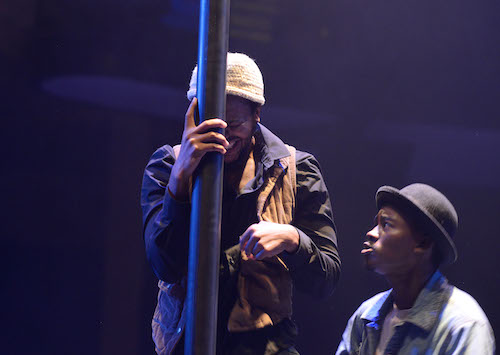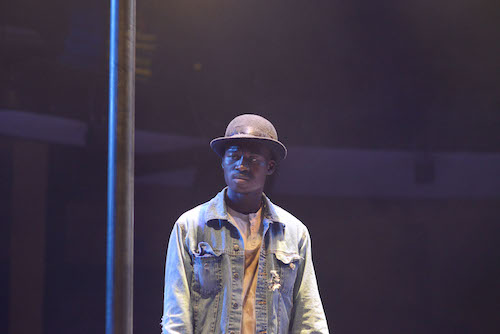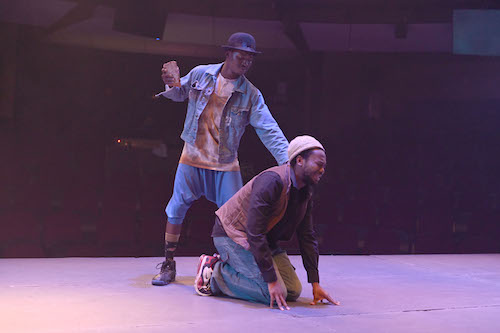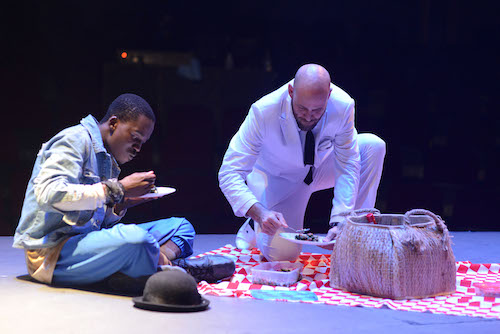 Every year, Johannesburg’s Market Theatre stages an Afro-American play to celebrate Black History Month.
Every year, Johannesburg’s Market Theatre stages an Afro-American play to celebrate Black History Month.
This year it’s a pleasure to leave the historical part behind and be slammed right into the gritty reality of black Americans today. No more plays featuring imaginary intellectual debates between Martin Luther King and Malcom X. Now we’re seeing the streets doused with the blood of Trayvon Martin and Eric Garner, just two of the many black men killed by US policemen.
‘Pleasure’ sounds like the wrong word for a play about police brutality and the despair facing poor, unemployed and homeless black men. But Pass Over written by Harvard graduate Antoinette Nwandu is a powerful piece of theatre and its actors here are delightful.
The play was partly inspired by the shooting of 17-year-old Trayvon Martin, and its style was influenced by Samuel Beckett’s absurdist play Waiting for Godot, whose characters Vladimir and Estragon endlessly debate things that will never happen and a future that will never come.
 In Pass Over we have Kitch (Hungani Ndlovu) and Moses (Khathu Ramabulana) living under a lamppost in the ghetto. There’s a lovely rapport between them, but I struggled to understand all the street-slang patter they exchanged, especially when either of them were speaking further down stage with their back to me.
In Pass Over we have Kitch (Hungani Ndlovu) and Moses (Khathu Ramabulana) living under a lamppost in the ghetto. There’s a lovely rapport between them, but I struggled to understand all the street-slang patter they exchanged, especially when either of them were speaking further down stage with their back to me.
The play was first performed by Chicago’s Steppenwolf Theatre Company in 2017, then adapted for a film by Danya Taymor and Spike Lee, and watching a snippet of the movie confirms that the enunciation could be clearer without degrading the authenticity.
Moses and Kitch dream of getting off the streets, out of the ghetto and into a better place – the Promised Land of milk and honey, caviar and sexy honeys. Their moods range from jocularity to despondency, with anger and fear mixed in. All a routine day in the life of black men in America, where undisguised racism is back in vogue bigtime. Sometimes their light-hearted banter or fanciful dreams of a better life are interrupted by the sounds of gunshots, with the perfectly timed combination of sound, lights and action making the audience jump too.
 Moses talks about rising up to his full potential and moving onward to a better life. Eventually he suspects that the only way of passing over to a better life will be through death, since Earthly life is an endless cycle of struggle for survival. “The police are out here doing what they do – killing Niggers, mostly,” he says.
Moses talks about rising up to his full potential and moving onward to a better life. Eventually he suspects that the only way of passing over to a better life will be through death, since Earthly life is an endless cycle of struggle for survival. “The police are out here doing what they do – killing Niggers, mostly,” he says.
Kitch is more open and optimistic, a playful character given to seeing the good in everything. World-weary Moses accuses him of being a Plantation Nigger with an appeasing tendency to ‘stay where he belongs’. But it’s human nature to nurture hope against all evidence to the contrary, and Moses can’t help yearning for that Promised Land. “We’re going to get off this here plantation, we’re going to get off this here block,” he says.
The tone changes abruptly when a third character arrives, a white man (Charlie Bouguenon) out of place in the ghetto. He’s polite and solicitous, generous with his food and concerned for their well-being. Until suddenly racism cracks through the veneer, and his concern is revealed to be fake tolerance.
 A white supremacist, of course, although I didn’t twig that at first, despite his pure white outfit from hat to shoes being a humdinger of a clue. This is excellent casting, with Bouguenon’s stage presence implying an assumed superiority.
A white supremacist, of course, although I didn’t twig that at first, despite his pure white outfit from hat to shoes being a humdinger of a clue. This is excellent casting, with Bouguenon’s stage presence implying an assumed superiority.
He also doubles up as a policeman, openly hostile and trigger happy. That’s when an “I can’t breathe” moment reminds you that Pass Over captures the reality of life on the streets for many black men – not only in America - and isn’t a work of fiction at all.
The play is being staged in the main John Kani theatre, with the large auditorium redesigned to create more intimate seating around a rectangular stage. Director James Ngcobo hasn’t tried to recreate a street scene, leaving our imaginations to fill in the picture around a lamppost on an otherwise empty platform.
The music by composer Kabomo Vilakazi enhances the mood well, with different styles varying around the key themes he identified of brotherhood, black empowerment, white privilege, self-belief, violence, fear, trust and trauma.
So no, Pass Over doesn’t present a pleasant reality, but it’s a pleasure to witness it.
Pass Over runs at Johannesburg’s Market Theatre until March 28. Tickets from Webtickets. Photos: Suzy Bernstein
